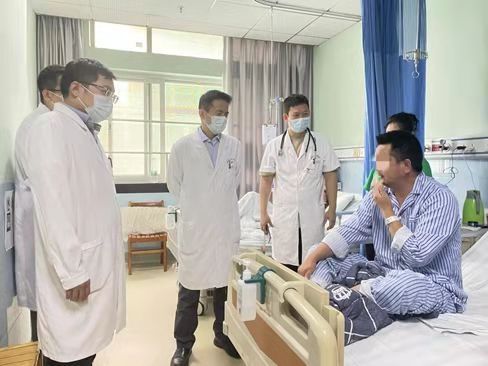The 45-year-old Mr. Li had drooping eyelids and weak limbs. He went to many hospitals for examination and found no problems. At this time, his eyes were almost completely unable to open. Finally, he was found in the Zhongnan Hospital of Wuhan University. The culprit turned out to be an intrathoracic tumor.
Mr. Li lives in Yingshan, Huanggang. Two months ago, his right eyelid always drooped unconsciously. People around him laughed and called him a “drowsy uncle” who “did not wake up”. He also thought it was caused by overwork and didn’t pay attention. A week later, Mr. Li had double vision and weakness in his limbs. He began to worry that the problem was not so simple, and decided to go to the hospital for a check.

In May, Mr. Li went to the local hospital to check his eyes and cervical vertebrae and found no problems, but his condition became worse. It became more and more serious, the eyes could not be opened at all, and there was even difficulty in breathing. At the recommendation of a friend, he came to the Zhongnan Hospital of Wuhan University for treatment. After receiving treatment from Hu Weidong, the chief physician of the thoracic surgery department, combined with the chest CT examination results, it was diagnosed that Mr. Li suffered from thymoma with myasthenia gravis, requiring surgical removal of all thymic tissue and tumors.
Considering that general anesthesia requires the use of muscle relaxants, muscle relaxants will aggravate the symptoms of myasthenia, resulting in slow recovery of postoperative respiratory function, and the need to use a ventilator in the intensive care unit for a long time. Increase the chance of lung infection and hospital stay. Hu Weidong decided to operate the “Da Vinci” surgical robot to perform total thymectomy for Mr. Li under non-intubation-preserving spontaneous breathing anesthesia, and worked with anesthesiologist Ding Ruiwen to formulate a thorough anesthesia and surgical plan.
Last weekend, the team of thoracic surgery Hu Weidong, Liu Jun and Cheng Nitao operated on Mr. Li. There is no need for endotracheal intubation, no muscle relaxants, and vagus nerve, phrenic nerve and intercostal nerve blocks, sedation and analgesia techniques, etc., to maintain Mr. Li’s stable state during the operation and minimize the side effects of anesthesia. Hu Weidong’s team used the three-dimensional vision of the surgical robot to flexibly operate the robotic arm to complete difficult and precise operations in a small space. It only took 40 minutes to completely remove the thymoma and all adipose tissue around the thymus. The operation was basically free of bleeding, and no indwelling catheter was required. Possibly reduce postoperative discomfort and facilitate rapid recovery.
On the second day after the operation, Mr. Li’s symptoms of muscle weakness improved significantly, his eyelids could open voluntarily, and he recovered and was discharged from the hospital on June 14. This is the first successful robotic-assisted total thymectomy under non-intubation-preserving spontaneous breathing anesthesia in Hubei.
Liu Jun, deputy director of the Department of Thoracic Surgery, introduced that thymoma is a common type of mediastinal tumor, most of which are malignant or potentially malignant, and generally require surgery. About 30% of patients with thymoma have myasthenia gravis, and the main treatment method is a combination of surgery and drugs. During surgery, the tumor, all thymus and all adipose tissue of the anterior mediastinum need to be removed to ensure a good therapeutic effect. Robot-assisted total thymectomy under non-intubation-preserving spontaneous breathing anesthesia can minimize surgical trauma, reduce medical costs, and help speedy recovery on the premise of ensuring the surgical effect.
“Most patients with myasthenia gravis have ocular muscle weakness, which is characterized by drooping eyelids and blurred vision. Many people mistakenly think that it is an ophthalmological disease, which delays the time to see a doctor.” Liu Jun reminded that the thymus As the tumor continues to grow, symptoms such as chest tightness, chest pain, and cough may occur. If combined with generalized muscle weakness and involving the respiratory muscles, breathing difficulties may occur, or even life-threatening. If the public has symptoms such as drooping eyelids and general malaise for unknown reasons, they should go to the hospital for examination in time.
Correspondent Li Han, Zhang Xiaomei, Jiupai news reporter Wang Jiaqing
[Source: Jiupai News]
Disclaimer: This article is copyrighted It is owned by the original author. If the source is wrong or your legal rights are violated, you can contact us by email, and we will deal with it in time. Email address: [email protected]